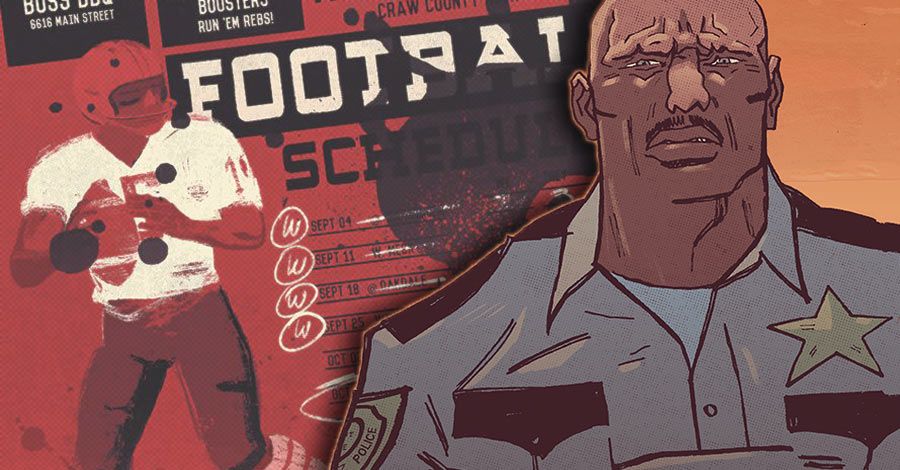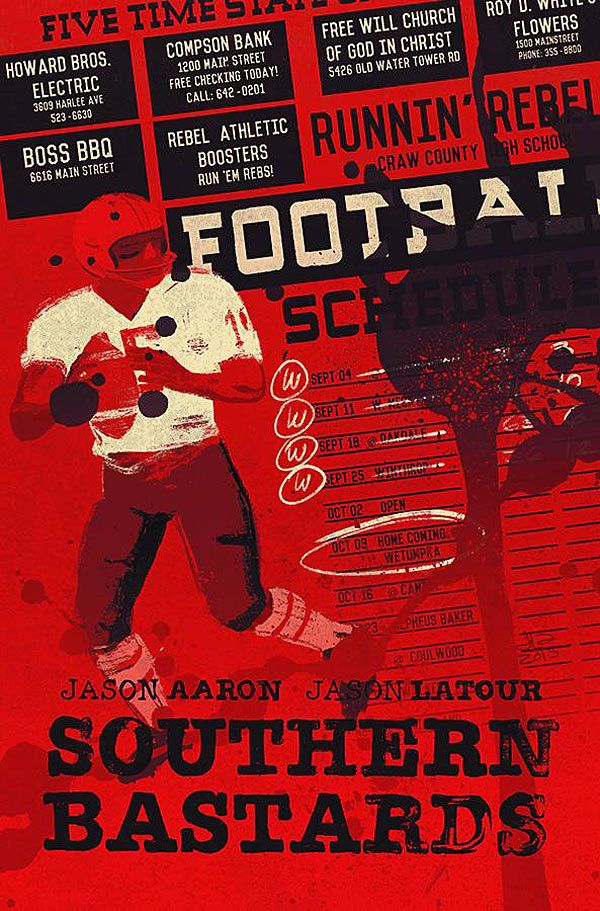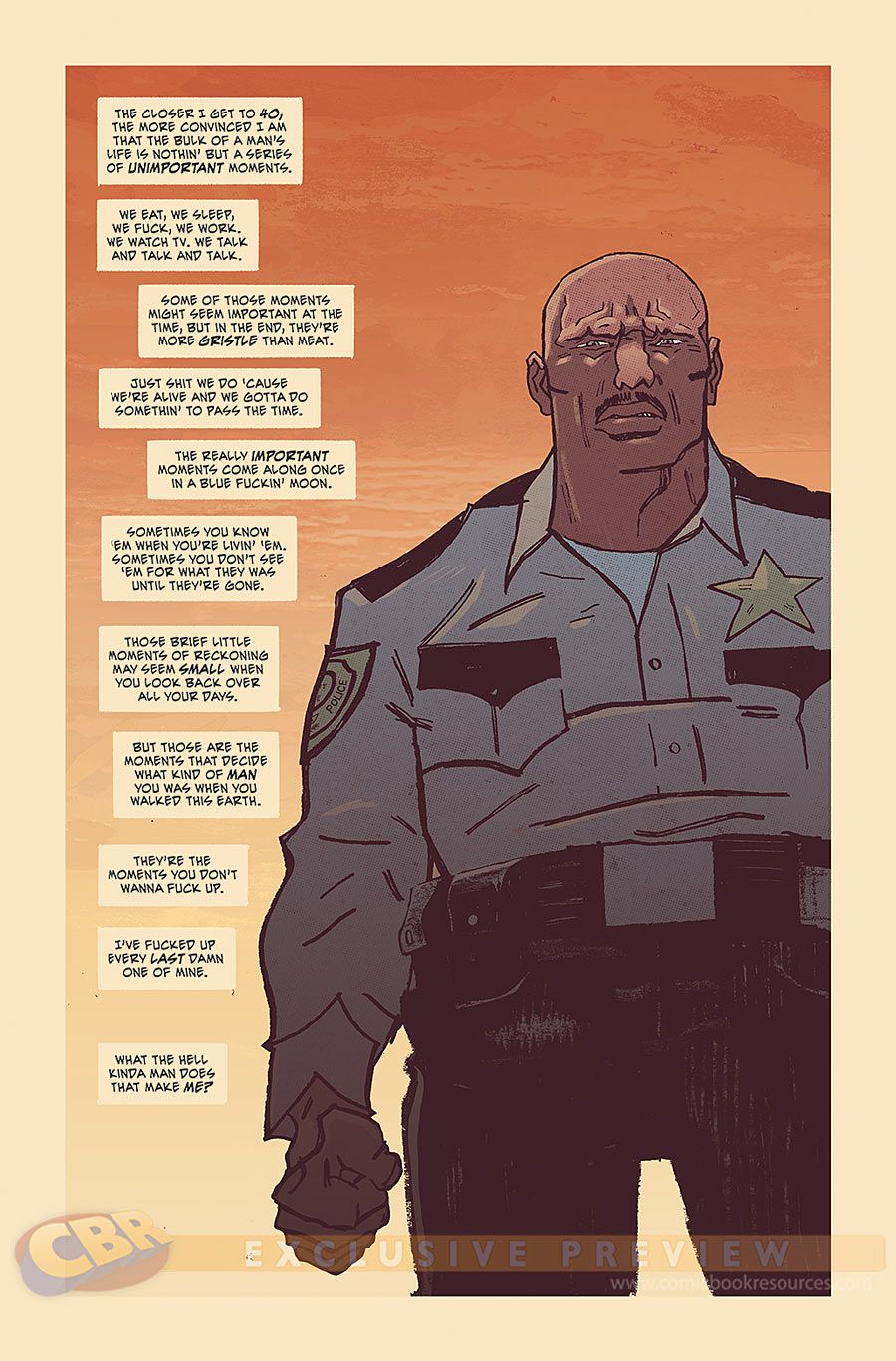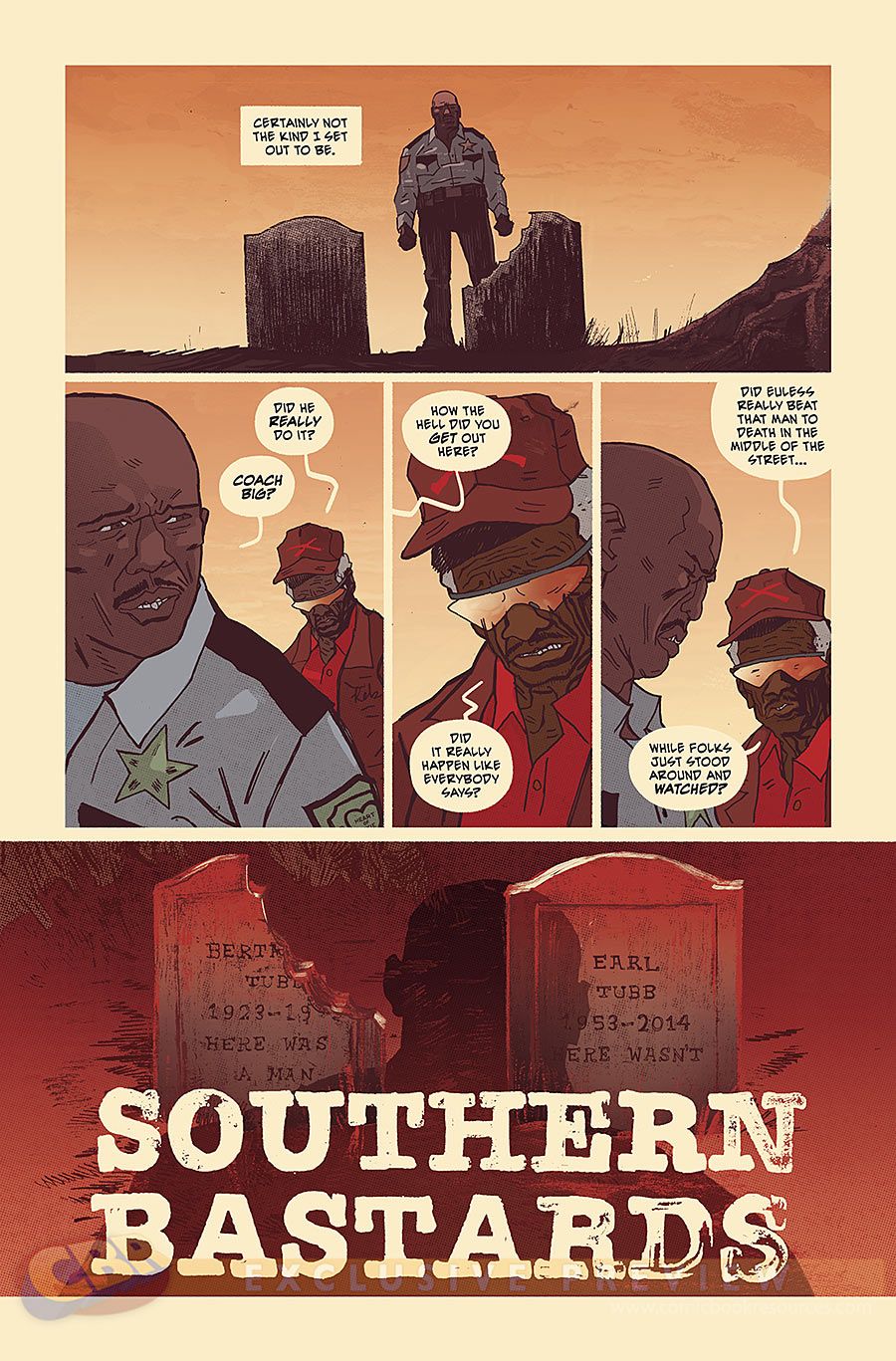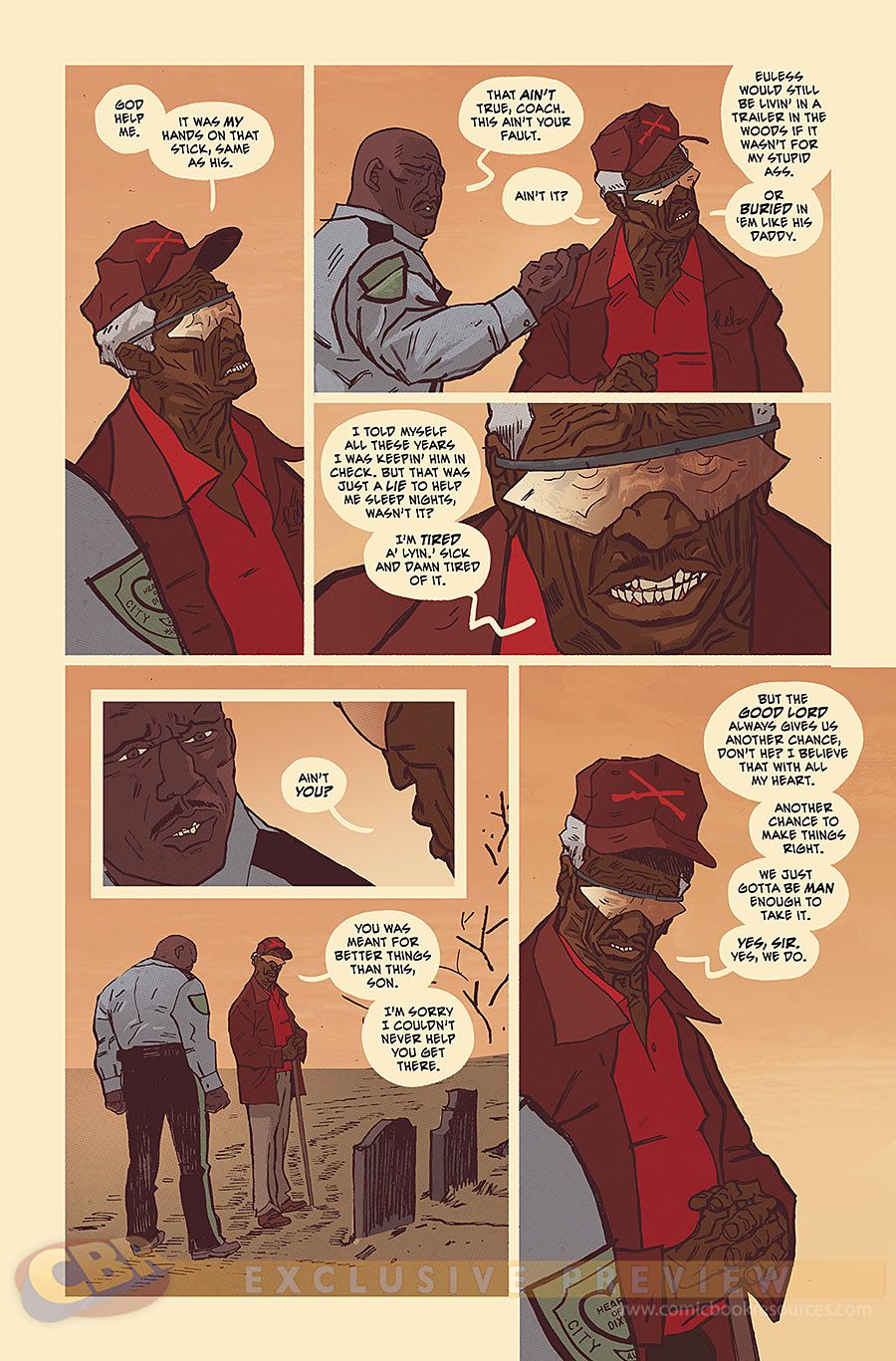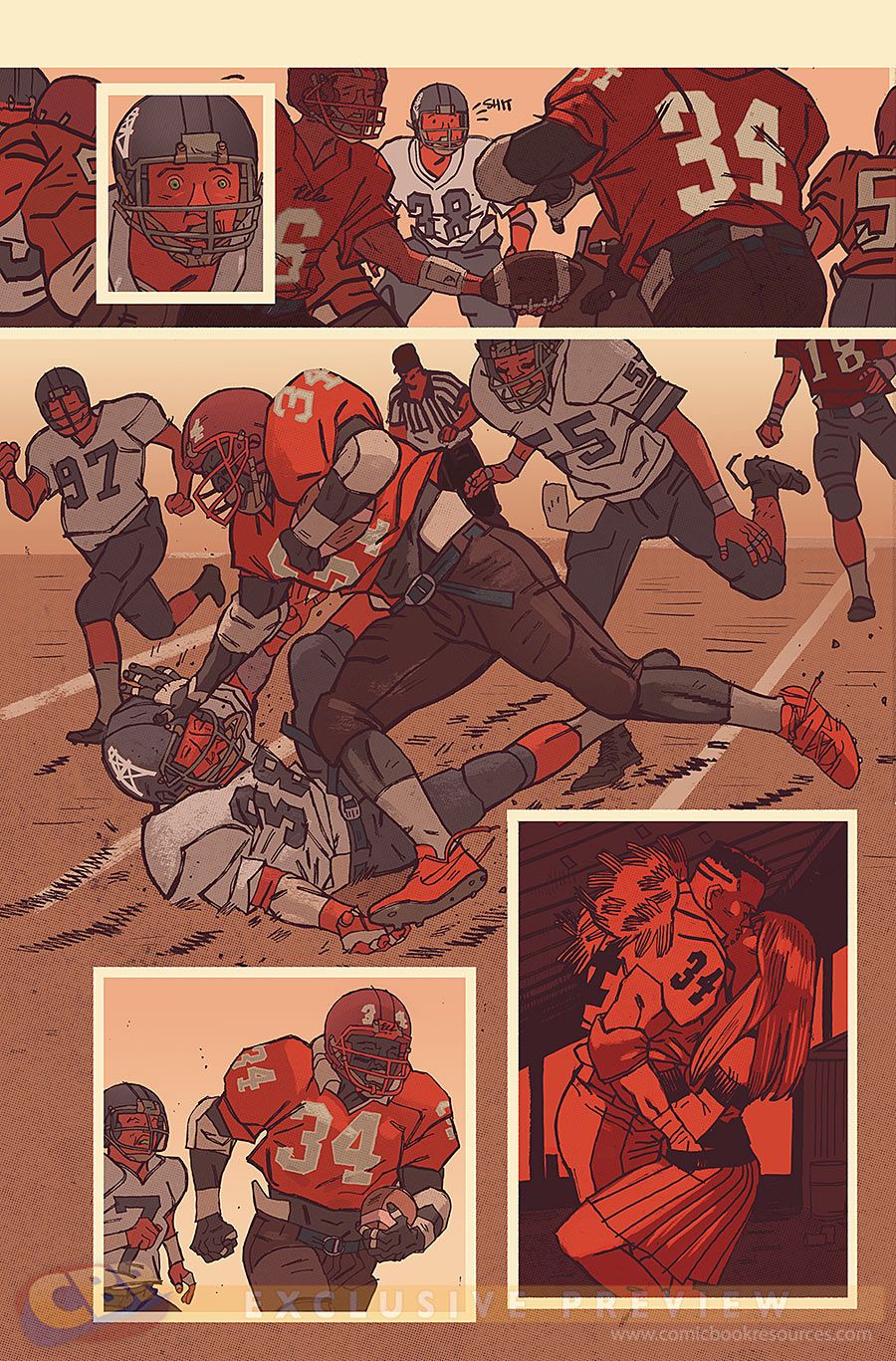The two most popular past times in Craw County, Alabama are football and crime. As the setting for writer Jason Aaron and artist Jason Latour's creator-owned Image Comics series "Southern Bastards," it's an intriguing combination especially since both fall under the dominion of the town's most powerful figure, high school football coach Euless Boss. Boss played the role of antagonist in the series' initial arc, "Here Was a Man," and stepped into the spotlight in the series second storyline, "Gridiron," which explored his past.
Aaron & Latour's "Southern Bastards" Gets Bloody in Second Arc
Boss is just one of Craw County's many interesting "Bastards," and in upcoming issues Aaron and Latour will take a closer look at some of the area's other rogues and reprobates as the title expands to become the story of a community and the impact of its bloody avocations.
That all begins in "Southern Bastards" #9 on June 24, the beginning of a new arc titled "Homecoming." Aaron and Latour spoke with CBR News about their plans for the arc in a wide ranging discussion that also included a look at the "Gridiron" arc, the role women will play in"Southern Bastards," and issue #12 which will be the first Latour-scripted issue of the series.
CBR News: Jason and Jason, let's begin with a bit of congratulations on your Eisner nomination for "Southern Bastards." I imagine this book isn't something you do for awards, but how does it feel to be nominated for "Best Continuing Series?"
Jason Aaron: It's cool. I don't think we expected that. And, yes, you don't really do anything to just get nominations or trophies, but it's certainly always cool to be nominated for something like that.
Jason Latour: Personally I do everything for awards! [Laughs] No, I agree with what Jason said. It's really gratifying to know that people actually recognize your effort.
I imagine it's especially gratifying when that recognition comes for a creator-owned book like "Southern Bastards."
Latour: Yeah, especially. I've never been through this before. Maybe it's old hat to Jason there, but to me it's exciting. He's a salty old dog.
Aaron: I've lost Eisners before, yes.
Latour: So in other words thanks to him we have no chance! We're cursed.
Aaron: [Laughs] In many ways!
Let's move into the recently completed "Gridiron" arc of "Southern Bastards." Readers saw the past of Craw County's resident crime lord, Coach Euless Boss, but it also felt like you were doing a dark crime story twist on a classic sports movie. Was that your intention?
Aaron: I guess. There's probably going to be a lot about the book that seems like a dark riff on a 1970s sports movie, which was the only decade where they made good sports movies. The sports movies from that decade usually ended with the good guys losing.
Latour: Or they got shot.
Aaron: [Laughs] Correct. In all these "feel good" movies from the 1970s the heroes usually lost. The Bad News Bears were great and finally came together and still lost. Rocky lost.
Latour: And doesn't Burt Reynolds get shot at the end of "The Longest Yard?"
Aaron: I believe he does, yeah.
Latour: We've diverged into a conversation about "The Longest Yard."
Aaron: We should. [Laughs]
It did feel like Coach Boss' past in "Gridiron" was a dark, crime/noir version of the film "Rudy."
Latour: In the past Jason has described Coach Boss as an evil version of Rudy. It was like a short hand that we tossed around a few times, but I think he's a little more interesting than just that.
Aaron: The idea for the arc was to give some back story on the guy who after the swerve at the end of issue #4 was revealed to be one of the main characters in the book. So this second arc was kind of like, "Okay, here's what the book really is." It's called "Southern Bastards" and this guy would appear to be the biggest bastard of them all. So we wanted to let you know who he is and how he became the way he is. And if you felt sorry for him as a kid that's good. If you don't and still think he's nothing but the worst villain in Craw County that's fine too.
I want readers to be able to figure out for themselves what they think of a character like Coach Boss.
Aaron Serves Up a 'Morally Ambiguous' Tale in "Southern Bastards"
So in "Gridiron" you had some fun with sports tropes, and as we talked about last time in the first arc you subverted the "Walking Tall" story. I can't imagine you'll be doing something like that every arc, but it seems like with this book your readers should expect the unexpected.
Latour: Absolutely.

Aaron: Yeah, hopefully with any book that you do, whatever it is, you always want to subvert expectations, or tropes, or anything like that. But yes, that's not something we're trying to do every arc.
Like we've talked about before, we're not afraid to lean into what are considered stereotypical elements of these stories and this kind of setting. So you're going to have the drunken redneck. You're going to have a character like Esaw, but we don't really know much about Esaw yet. There will be a point where he'll be more fleshed out and hopefully become something much more.
Latour: Yeah, having lived and come from this area when you visit other parts of the world people apply those stereotypes to you whether they know it or not. The rest of the world associates our culture with a lot of the things you might consider stereotypical in stories and films. So some of the fun of telling a story like this is the chance to peel back those layers because I have a lot of firsthand experience with people doing that with me in real life. [Laughs] So it just feels natural to approach it that way.
Going back to what you said about Coach Boss, it feels like "Southern Bastards" is similar to your previous creator-owned series "Scalped" in that there's no such thing as a protagonist and antagonist. Everything is just one big story with different sides.
Aaron: Yeah, or it can change from story to story or issue to issue. I want it to be a little more challenging and a little more nuanced than just 'here's the guy in the white hat' and 'here's the guy in the black hat.' I want you to find your way through the muck as we go. I want you to figure out for yourselves what you think about certain characters as opposed to just Latour and I telling you, "This is what you should think of this guy." Because that's not what life is like right?
I think that every one of us, at some point in our life, had at least one scene or a few scenes where we're the bad guy; where we're the asshole. It doesn't matter if you're the sweetest person alive. Even Mother Theresa at one point had to have a scene where she was the asshole.
Latour: [Laughs]
Aaron: Latour maybe has more than me.
Latour: [Laughs] It's also interesting to watch those scenes as an outside observer. If someone were to watch the movie of your life they're going to see those scenes different from the people that were in them.
That was sort of the key to how "Scalped" functioned and I think it's how this will, too. You're sort of an omniscient fly on the wall for all of this stuff. You'll get to see sides of every character that you may not expect just by virtue of the fact that you spend time with them.
My first real experiences with that types of nuanced crime fiction was probably the movie "Heat" and the novels of James Ellroy.
Latour: That's certainly good company to be in. Thank you.
Aaron: Yeah, Ellroy's books are a great example of where it's hard to figure out who to root for and who the good guys and bad guys are. Because even the good guys usually have some really horrible flaws. That's the stuff I find interesting. So that's what we're trying to build with "Southern Bastards," and I think you'll see more and more of that as we go. Because we've still only met just a small part of the cast. In issue #5 we kind of got a glimpse of some other people who are out there. So we'll start to meet more of them pretty soon.
CBR SUNDAY CONVERSATION: Jason Latour's Southern Roots
Let's talk a little bit about the visuals of "Gridiron." Jason, what was it like telling a story that was mostly a period tale? Is that something you enjoy doing?
Latour: I actually have a lot of experience doing period stuff at this point.

Aaron: It's because you're an old soul.
Latour: [Laughs] Yeah. I've been very lucky in the sense that I've gotten to do stuff like that, and I've always aspired to do different kinds of stories. At this point I've done a western with "Django [Unchained]." I've done World War II stuff. And now I've done '70s football.
It's always a little maddening to do the research for it, but with football and this time period I was lucky because I have some fun experience with those things. So it wasn't as labored as it would have been if I were trying to do a World War II story.

That stuff is always fun, but I don't know how accurate it is. You always try to make an effort to do that, but your own personal take on things always sort of wins out in the end. That's where some of the personal experience with it comes in handy.

Growing up as a kid we'd go to visit my grandparents farm back in the '80s, and it sort of felt in some ways like that area was caught in a time bubble. So that's why you might see things like cars that were much older than the time period we're exploring. It wasn't because a lack of a research process.
Some of the visual approach to the first arc, and this is going to be a weird analogy, was a bit like "Star Wars" in the sense that it was a "used" future. It was based around a consumer culture that sort of discarded an area. I think in this last arc we got to see that in a little more virgin state. There's some overlap in the way we approached things in the first and second arcs, but hopefully you can see some important differences there.
Last time we talked about the prominence of the color red in the first arc. That color figured into the second arc, but it felt like it was most prominent when it was game time on the football field. Was that your intention?
Latour: There's an internal logic to it more than anything. In the first arc red was a huge part of Earl [Tubb]'s memories, which are very vivid all the time. Every time Earl flashes back it's to a very violent moment or a moment that has a lot of emotional impact.

With the second arc you're with Euless for a much longer period of time. So things are tinged red and they only flare up in moments that are emotionally impactful. That's the basic inner working of it. So since he's obsessed with football those are certainly going to be the moments where you see the biggest flourishes of red.
Fathers and father figures have loomed very large for the central characters in these first two "Southern Bastards" stories. It begs the question, how important will mothers be in future tales?
Aaron: That's a good question. One of the weaknesses of the book so far, I guess, would be the lack of female characters. We've certainly teased a big one in that we found out at the end of the first arc that Earl had a daughter. We see her again at the end of the second arc. So clearly she's coming.

As we go forward and in the next arc we really start to expand the cast. So you'll see more of the ladies of Craw County.
Latour: I'd also add that I think a lot of what the book is about on some level is masculinity run amok, and a lack of a maternal presence really does have a huge impact on the way these people behave.
We've seen a lot of really competitive male egos thus far, and I think that it's not a mistake that there's no women actively involved in these people's lives to sort of balance them out. So some of that I certainly feel is done with purpose. It's not a thing that we're not aware of.

Aaron: We're telling a very particular story with these first two arcs. It's not like we woke up one day and realized there was no women in the book. This was the plan.
What can readers expect from this next arc?
Aaron: The first issue in it, issue #9, focuses on the sheriff who we saw mostly in the first arc. We don't even know his name yet. We know he was standing there watching and doing nothing while Coach Boss beat Earl Tubb to death in the middle of the town. So we really dive into his head and find out what's lead him to where he's at now and get an idea of where he's headed moving forward.

Some of the other characters we'll meet or focus on are ones we've met before like Esaw gets an issue. Others, though, are brand new. If you go back to issue #5, you can flip through and there's a montage that's a sort of tease of some different characters around Craw County and outside of it that are connected to Coach Boss in different ways.
The theme of the next arc is homecomings. So it's all about homecoming week and the big homecoming game, which is against Craw County's biggest rival, Wetumpka County. So we'll have some separate almost standalone issues that focus on different characters that all flow together as we build over the course of homecoming week towards that big game.
Of course, Coach Boss will have to deal with the fallout from the end of issue #8 and the surprise that happened there.
The two teases we've had of Roberta Tubb certainly have readers anticipating her arrival in Craw County. Will we see that happen in this homecoming arc or is Roberta's journey to Craw County more of a slow burn?
Aaron: We can confirm we'll see more of her this arc, right?
Latour: Yeah, I believe so. It's still a slow burn, but there will be much more of her in this arc than you've ever seen to date. One of the aims of this arc will probably be to put her boots on the ground, so to speak. That's something that we're going to be very, very patient with though because it's a very important piece to this whole puzzle. We have to lay down the other pieces to carve out that space before we can dive right into it.
Aaron: The arc is called "Homecoming" and it has a couple different meanings.
RELATED: CBR TV: Aaron Talks Female "Thor," "Star Wars" at Marvel & Creator-Owned Success
Will "Homecoming" unfold entirely in the present day or will there be flashbacks intertwined with the modern narrative?
Latour: There are flashbacks that are interspersed throughout, especially in that first issue. Some of these characters will have a mini arc within the issue. It will be sort of similar to the way we dove into Euless' backstory in arc two.
Again, the sheriff is the first focus character in the arc, and a lot of what he's been through and is going through mirrors things that have happened with Earl and Euless in the first two arcs. So the presentation is somewhat similar.
Aaron: Like Jason said, there are flashbacks sprinkled in but this is more a present day story, where the second arc was mostly a flashback story that kind of brought us up to the present day at the very end.
This third arc is about fleshing out the cast and meeting other people who are important in Craw County, but it's a present day story that builds towards this big game; this big pivotal moment for Coach Boss.
One thing about the third arc that will be a little bit different is that it will be the first time we see Latour write an issue
Latour: Yeah. I'm writing issue #12.
Are you drawing it as well?
Latour: Not really. [Laughs] I'm probably going to be doing the finishes on it. It's a little too early to go into that, but yes, I am writing issue #12.
I imagine you've contributed to the the ongoing story all along, but how does it feel to be writing your first "Southern Bastards" script?
Latour: Yes, usually we're both very involved on the story side of things, but when it comes to actually writing the script that's Jason's job. So Jason has been very gracious in allowing me to play with an issue and this seemed like a very natural place to do it. Because some of these stories aren't self-contained, but they stand alone a little bit more as short stories.
So issue #12 will deal with one of my favorite characters, Tad. He's the little kid we met in arc one who was hanging upside down in the tree. So we'll get to see what's happened to him since he was sort of left disabled in a hospital. It's a different story than anything you've seen from us to date, [Laughs] but I think it should still fit into the world we built together pretty naturally.
Aaron: I'm excited, not because I get to take an issue off, but I think it's cool to have Latour write something for the book. He's shown what a great writer he is with the other stuff he's done. Plus with "Spider-Gwen" blowing up the way it has and being the hottest book in comics right now, I think it's a huge testament to Jason. So I think it's cool to have him play in this playground and show that we're very much co-creators on this book.
This is not a work for hire situation for either one of us. This is very much our baby that we create, build, and guide together. So having Jason write an issue I think is a great way to demonstrate that.
You will not see me drawing any issues though. [Laughs]
Latour: [Laughs] Unfortunately. We might be able to do a Jason Aaron variant cover.
Aaron: Yes, a very, very limited variant.
Let's conclude by talking about your long term vision for "Southern Bastards." Is this a series that you guys have outlined pretty far ahead? Sales permitting, do you know how and when the series will end?
Latour: We definitely have an ending in mind. Like you said, it does depend on sales, but this was never something I waded into to get rich off of. It's nice when it does well, and hopefully it will continue to justify its own existence. There's certainly an ending we want to see play out though. Some of the time that it takes to get there is obviously negotiable.

The way I always explain it is it's kind of like, "We're getting in a car and we're going on a road trip. We can either take the highway or the scenic route." And to some degree we can do both. So it will just depend on how things are lining up as we sort of move along. We definitely know where we're going though.

Aaron: I always feel like whenever I sit down to write something or start a story I've got to know where I'm headed. I've got to know where the ultimate destination is, and that really kind of tells you what the story is. I've got to know what I'm writing is really about before I get started.
So yeah, we've always known what the grand plan was and where things are headed. It's just filling in the stuff in the middle, which is kind of how I did "Scalped." I had a pretty detailed outline of "Scalped" initially, but then, at some point, we got past that. I always knew where the characters needed to end up, and in the interim we were able to explore some different places.
That's definitely what we're doing here. So we don't have a specific issue number to end on or anything like that, but we're certainly enjoying the ride and it kind of feels like we're just getting started.
Hopefully we'll see more recipes coming up. The gauntlet has been thrown to Latour since my mom did one.
Latour: [Laughs] Oh yeah, she's going to love that.
Plus I'd definitely encourage people to send recipes in. We'll have to have our "Just the Tips"-style cookbook. We could call it "Just the Tips," too! It would be like rib tips. [Laughs]
Aaron: [Laughs]
Latour: We don't need to design it or anything. For the cover we'll just spell ribs with barbecue sauce on my finger.
Aaron: [Laughs] I do love that our book is like the only one on the shelves where you can read the letters column and get recipes for biscuits and fried pies and who knows what else.

That's one of the things I like about Image right now. It does feel like there's a real diverse mix of stuff coming out from them. Everything is not the same note. They don't all appeal to the same audience. They don't all look the same. Really all they have in common is a bunch of creators doing exactly the kind of books they want to do.
So I like the fact that there's not another book out there that I think looks or feels exactly like "Southern Bastards."
"Southern Bastards" #9 goes on sale June 17 from Image Comics.

